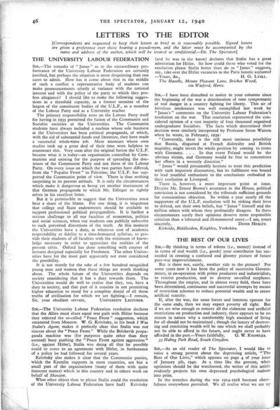LETTERS TO THE EDITOR
[Correspondents are requested to keep their letters as brief as is reasonably possible. Signed letters are given a preference over those bearing a pseudonym, and the latter must be accompanied by the name and address of the author, which will be treated as confidential.—En. The Spectator]
THE UNIVERSITY LABOUR FEDERATION
SIR,—The remarks of " Janus " as to the extraordinary per- formance of the University Labour Federation are certainly justified, but perhaps the situation is more disquieting than one cares to admit. How has it come about that in the middle of such a conflict a representative body of students can make pronouncements utterly at variance with the national interest and with the policy of the party to which they pro- fess allegiance? I should like to make the following sugges- tions in a threefold capacity, as a former member of the largest of the constituent bodies of the U.L.F., as a member of the Labour Party and as a University teacher.
The primary responsibility rests on the Labour Party itself for having in 1935 permitted the fusion of the Communist and Socialist societies at the Universities. The Communist students have always included a nucleus whose sole business at the Universities has been political propaganda, of which, with the aid of substantial funds and literature, they have made a successful whole-time job. Mere amateurs whose own studies took up a great deal of their time were helpless to counteract this. Very soon after the original fusion the U.L.F. became what it is today—an organisation controlled by Com- munists and existing for the purpose of spreading the doc- trines of the Communist Party and not those of the Labour Party. On every issue on which the two parties have differed, from the " Popular Front " to Palestine, the U.L.F. has sup- ported the Communist point of view. There is thus nothing surprising in its present attitude. It is only the circumstances which make it dangerous as being yet another instrument of that German propaganda to which Mr. Edinger so rightly refers in his excellent letter.
But it is permissible to suggest that the Universities must bear a share of the blame. For one thing, it is iniquitous that college and State endowments should be available to support professional political propagandists. It is further a serious challenge to all our faculties of economics, politics and social sciences, when our students can publicly subscribe to such perverted distortions of the truth. At this moment the Universities have a duty, at whatever cost of academic respectability or fidelity to a time-honoured syllabus, to pro- vide their students of all faculties with the minimum of know- ledge necessary in order to appreciate the realities of the present crisis. Oxford has done something with courses of lectures designed especially for Freshmen. The other Univer- sities have for the most part apparently not even considered the possibility.
It is not merely for the sake of a few hundred misguided young men and women that these things are worth thinking about. The whole future of the Universities depends on society considering that it has a duty towards them. The Universities would do well to realise that they, too, have a duty to society, and that part of it consists in not permitting higher education to stand for a complete denial of all those truths of civilisation for which we are fighting.—I remain,


































 Previous page
Previous page